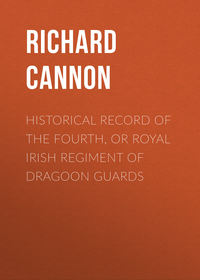 полная версия
полная версияHistorical Record of the First Regiment of Foot
In November of this year General the Hon. James St. Clair died at Dysart; and the Colonelcy of the Royal Regiment was conferred on his cousin, Sir Henry Erskine, from the Twenty-fifth Regiment.
17631764At the peace in 1763 the Havannah was restored to Spain; and the several companies of the second battalion were withdrawn from North America and the West Indies, and sailed for England. In 1764 this battalion proceeded to Scotland, where it remained four years.
1765Sir Henry Erskine died in August, 1765, and was succeeded in the Colonelcy of the Royal Regiment by John Marquis of Lorne, afterwards Duke of Argyle.
17681st BattIn January, 1768, the first battalion embarked from Ireland for Gibraltar, and was stationed in garrison at that important fortress for several years.
2nd Batt1771The second battalion remained in Scotland until the spring of 1768, when it returned to England; and in April, 1771, it embarked with the 51st and 63rd Regiments for the island of Minorca, to relieve the 3rd, 11th, and 67th Regiments.
17751st Batt2nd Batt1776The first battalion was relieved from garrison duty at Gibraltar in the autumn of 1775, and arrived in England in December of the same year. The second battalion was also relieved at Minorca in a few weeks afterwards, and arrived in England in February, 1776; and both battalions remained in Britain until the autumn of 1780.
17801st BattThe contest on the subject of taxation between Great Britain and her North American Colonies having given rise to hostilities in 1775, the insurgents were abetted by France, Spain, and Holland. The French monarch openly declared in favour of the rebellious colonists in 1778, the Spaniards in 1779, and a secret treaty between the Dutch and Americans was discovered in 1780. Thus the contest assumed a formidable character; hostile proceedings extended from North America to the West Indies; and in November, 1780, the first battalion of the Royal Regiment embarked from Portsmouth to take part in the contest.
1781On arriving in the West Indies the Royals proceeded, with other troops commanded by Major-General Vaughan, and a naval force under Sir George Brydges Rodney, against the Dutch island of St. Eustatia, which surrendered on the 3rd of February, 1781, together with the neighbouring isles of St. Martin and Saba. Property to an immense amount was captured on this occasion, and a severe blow was thus inflicted on the Dutch.
1782The first battalion was afterwards stationed on the island of St. Christopher, together with the flank companies of the 15th, and a detachment of the Royal Artillery, which, with a few militia, constituted the whole military force on the island, and was commanded by Lieut. – Col. Thomas Fraser of the Royals, "a brave old officer,"97 who acted as Brigadier-General under the Governor, Major-General Thomas Shirley.
In the early part of January, 1782, a French naval force, and a fleet of transports with an army on board, appeared before the island; and the commander of the British troops, being unable to oppose so formidable a host, retired to Brimstone Hill, where he was joined by the governor with a few militia. Unfortunately, the principal inhabitants were in the interest of the enemy; so much so, that twelve brass 24-pounders, two 13-inch mortars, and a quantity of ammunition, sent from England for their defence, were suffered, by the Council and Assembly of the island, to lie in a useless state at the foot of Brimstone Hill. The French Commander, the Marquis de Bouillé, immediately landed 8000 men and a formidable train of artillery, and advanced towards the hill on which the garrison had taken post. The ground occupied by the Royals, flank companies of the 15th, and militia, was about 200 yards in diameter, and remarkably strong; but the fortifications were old and in a ruinous state, and the troops had no intrenching tools: they, however, resolved to defend the place as long as possible, in hopes of being relieved.
Although the French had so great a superiority of numbers they did not venture to attack the little band of stout-hearted Britons on Brimstone Hill by storm, but commenced the siege in regular form, – breaking ground on Sommerfall's estate on the north-west side, and on Rawlin's estate on the old road-side. The French artillery opened its fire on the 19th of January, and from that day a storm of balls and bombs rattled round Brimstone Hill with increasing fury, until the houses on the heights were battered to pieces, and the old works were nearly destroyed.
During this period Rear-Admiral Hood appeared before the island with a British naval and land force, and a body of troops effected a landing on the 29th of January; but the French had so great a superiority of numbers, and they had completely surrounded Brimstone Hill, so that these few troops could not be of any use in attempting to save the island, and they re-embarked.
The fire of the French batteries had, in the meantime, dismounted or disabled nearly all the guns on the hill; several large breaches had also been made in the works on the north-west side of the fort; the garrison was reduced by sickness and other casualties to about 500 men; the want of intrenching tools rendered it impossible for the men either to repair the damaged works or throw up intrenchments; the provision-stores had also been destroyed by the French batteries; and the few remaining men fit for service had to be under arms every night, expecting the enemy to storm the hill. Yet, under all these disasters, the garrison evinced that valour, firmness, and constancy, for which the British soldier has been distinguished at periods of extreme danger and privation.
At length the governor and commander of the forces "thought they should be wanting in humanity to the brave soldiers who had behaved so long with such fidelity and courage if they should subject them to all the horrors of an assault, which, from the superior numbers of the enemy, and the ruinous condition of the place, could not fail to succeed. They therefore proposed a cessation of arms on the 12th of February, for adjusting the terms of capitulation, which was done, as the Marquis de Bouillé did not impose hard terms on the soldiers of a garrison who had acquitted themselves so well and had suffered so much."98
The garrison marched through the breach with drums beating and colours flying, and, having laid down their arms, the militia proceeded to their homes, and the regular troops were sent to England, on condition that they should be considered as prisoners of war until exchanged. Brigadier-General Fraser observed, in his despatch: – "Notwithstanding the event has proved unfortunate, I should be wanting in doing justice to the troops under my command if I concluded without saying that both officers and soldiers deserve the highest commendation. Under a constant fire of shot and shells, night and day (that I doubt has, in any instance, been exceeded), the officers showed a constant and universal cheerfulness, and by their example the soldiers bore the greatest fatigue with a firmness that deserves my acknowledgments." The loss sustained by the battalion during this siege was, Lieutenants Wilson and Clerk, Quarter-master Shungar, 3 serjeants, 2 drummers, and 22 rank and file, killed; Captains Wallace and Buckeridge, Surgeon Young, 6 serjeants, 4 drummers, and 84 rank and file, wounded; 2 private men missing.
After the capitulation the battalion proceeded to England, where it arrived in May, and, its exchange having been settled, it resumed military duty.
Both BattsOn the 9th of May, 1782, the Duke of Argyle was removed to the 3rd Foot Guards; and the Colonelcy of the Royal Regiment was conferred on Lord Adam Gordon, fourth son of Alexander, second Duke of Gordon.
17832nd Batt17841st Batt1790Both battalions remained in England until the autumn of 1783, when, peace having been concluded, the second battalion embarked for Ireland, from whence it proceeded, in the following year, to Gibraltar to relieve the Hanoverian corps, which had been performing duty in that garrison during the war. At the same time the first battalion proceeded from England to Ireland, where it remained until January, 1790, when it embarked for the West Indies to relieve the 3rd Foot, and on its arrival at its destination it was stationed at Jamaica.
2nd Batt1793Meanwhile a revolution had broken out in France; and in 1793 the French Monarch, Louis XVI., was beheaded by his subjects. Anarchy, confusion, and bloodshed prevailed in that kingdom, and the revolutionary party sought to involve other nations in the like horrors. War was the result. A powerful party, with principles favourable to monarchy, still existed in France; and, although the kingdom was governed by republicans, who maintained their authority by the terrors of the guillotine, yet many patriots stood forward with boldness in the cause of royalty; and a union took place between the cities of Marseilles, Lyons, and Toulon, in favour of Louis XVII., which alarmed the ruling powers. A republican army was sent against them, and Marseilles immediately surrendered. At the same time the inhabitants of the celebrated port of Toulon, the principal station of the French navy, joined with Admiral Turgot in proposing a negotiation with Admiral Lord Hood, who commanded a British naval force in the Mediterranean, and the port was taken possession of in August, 1793, by the British, in the name of Louis XVII. The French general had no sooner obtained possession of Marseilles than he advanced against Toulon. Strenuous exertions were made to procure troops to defend the place: besides French loyalists and a few British troops, detachments of Spaniards, Neapolitans, and Sardinians, were procured, and the second battalion of the Royal Regiment embarked from Gibraltar to take part in this service.
The battalion landed at Toulon towards the end of October, and marched on the evening of the same day to an out-post called Les Sablettes, where it was partially engaged with the enemy. Three companies were afterwards detached to Fort Mulgrave, an important post on the heights of Balaguier, which covered the town and harbour. This post was attacked on the evening of the 15th of November by a strong body of French republicans, who were repulsed and driven back. Lieut. – General O'Hara stated in his despatch on this subject: – "I have particular pleasure in mentioning that, on this occasion, the very spirited exertions of the British troops stationed in Fort Mulgrave, consisting of a detachment of the second battalion of the First, or Royal Regiment of Foot, commanded by Captain Duncan Campbell, and of a detachment of the Royal Artillery, commanded by Lieutenant Lemoine, were the principal means of repulsing the enemy, and of saving that important post. Our loss, including Spaniards, Neapolitans, and Sardinians, amounted only to 61. Among the wounded were Captain Duncan Campbell, of the Royals, and Lieutenant Lemoine, of the Artillery."
The enemy afterwards erected a battery on the heights of Arenes, which much annoyed one of the principal out-posts; and a detachment of the Royals formed part of the force, consisting of 400 British, 300 Sardinians, 600 Neapolitans, 600 Spaniards, and 400 French, commanded by Major-General David Dundas, which issued from Toulon on the morning of the 30th of November, crossed the river, traversed the olive-grounds, ascended the heights of Arenes, and carried the battery with signal gallantry. British valour was conspicuous on this occasion; but, unfortunately, an excess of ardour led to a disastrous result. The French fled in dismay down the hill; the British and other troops, following in full career, passed the valley, and ascended other heights at a considerable distance; and when out of breath, and exhausted with the chase, they encountered a superior body of fresh adversaries, and were forced to retreat, and Lieut. – General O'Hara was taken prisoner. Sir Gilbert Elliot, Bart., who was an eye-witness, observed, in a letter to the Secretary of State: – "It is a real consolation to know that the courage of the British was conspicuous from the beginning of the action to the end; and that an excess of that good quality was the true and only cause of the miscarriage." The Royals lost, on this occasion Lieutenant M'Kellar, 1 serjeant, and 9 rank and file, killed; Lieutenants Mackenzie and Colin M'Donald, with 2 serjeants, 1 drummer, and 32 rank and file, wounded; Captains Reeves and Finnay wounded, and taken prisoners; Lieutenant Bird, 2 serjeants, 1 drummer, and 17 rank and file, missing.
The defence of Toulon with only 12,000 men of five different nations, against an army of between 30,000 and 40,000 men, was found a difficult service. The garrison had to occupy a circumference of fifteen miles, by a number of posts, which required 9000 men for their protection. In the middle of December the republican army attacked the line of posts with great fury, and forced a passage at several places. The Royals were engaged in the defence of Fort Mulgrave, and lost 1 serjeant, 1 drummer, and 18 rank and file. After the line of posts was forced it was found impossible to maintain the town; the French shipping, magazines, and arsenal, were consequently set on fire, and the men of the several nations embarked on board the fleet on the 19th of December. Detachments of the troops took part with the seamen in the work of destruction; and Lieutenant Ironmonger, of the Royals, is stated to have been the last officer who quitted the dock-yard gates. With the republican army which attacked Toulon was an officer of artillery, named Napoleon Bonaparte, who afterwards arrived at the dignity of Emperor of France.
1794After the evacuation of Toulon the fleet remained five weeks in the bay of Hieres, during which time arrangements were made for attacking the island of Corsica: the fleet weighed anchor on the 24th of January, 1794, but was dispersed by a gale of wind, and the Royals were driven to one of the ports in the island of Elba, where they remained several days. On the 5th of February they again put to sea, and on the evening of the 7th landed, with the 11th, 25th, 30th, 50th, 51st, and 69th Regiments, in an open bay in the Gulf of Fiorenzo, in the island of Corsica. On the following day the Royals and 51st were detached, under Lieut. – Colonel (afterwards Sir John) Moore, with a small howitzer and a six-pounder carried on the shoulders of a party of seamen, against Fornelli Tower, and after traversing eight miles of rocky mountainous country, destitute of roads, arrived at the heights above the tower, but found the distance too great for the light artillery to reach it; and the two battalions afterwards retired. Batteries were subsequently erected against Convention Redoubt, which was considered the key to the works on this part of the island; and, the fire of the artillery having produced some effect, the Royals, commanded by Captain Mackenzie, and 51st Regiment, moved from their camp-ground on the morning of the 17th of February to attack the advanced point of the redoubt; at the same time the 50th Regiment marched against the centre of the work, and the 21st proceeded along the sea-shore; the whole commanded by Lieut. – Colonel Moore. After traversing some rocky grounds covered with myrtle-bushes with great caution, the troops arrived in the vicinity of the redoubt unperceived by the enemy; then, rushing forward, entered the works, and with their bayonets drove the French and Corsicans down the steep hill in the rear. The enemy soon afterwards evacuated the town of Fiorenzo, with the towers and batteries in the gulf, and retreated to the Tower of Tichine, situated on a high mountain between Fiorenzo and Bastia, an important sea-port and the capital of the island. Speaking of this event, Lieut. – General Dundas observed in his despatch, – "The conduct of Lieut. – Colonel Moore, of the several commanding officers, and of the officers and soldiers under his orders, was firm and judicious, and merits every commendation."
Bastia was afterwards besieged by sea and land, and surrendered on the 22nd of May. An assembly of the Deputies afterwards agreed to unite the island to Great Britain, which was performed with the solemnities customary on such occasions. But Calvi, a fortified town thirty-three miles from the capital, and situated on a tongue of land which forms one of the most beautiful harbours in the island, still held out; and the Royals formed part of the land force commanded by Lieut. – General Stuart selected for the siege of this place. The battalion accordingly embarked from Bastia, and, having landed near Calvi on the 19th of June, took post on a ridge of mountains three miles from the town. Owing to the numerous rocky heights and steep mountains before the town, the soldiers and seamen had to make roads along difficult precipices, to drag the guns up the mountains, and to carry up materials for erecting the batteries, which they performed with cheerful alacrity. The fire of the heavy artillery having made a practicable breach on the west side of the Mozello, on the 18th of July the light infantry and Royals, commanded by Lieut. – Colonel Moore, "proceeded with a cool, steady confidence, and unloaded arms, towards the enemy, forced their way through a smart fire of musketry, and, regardless of live shells flung into the breach, or the additional defence of pikes, stormed the Mozello; while Lieut. – Colonel Wemyss, with the Royal Irish Regiment, and two pieces of cannon, under the direction of Lieutenant Lemoine, equally regardless of opposition, carried the enemy's battery on the left, and forced the trenches without firing a shot."99 The capture of these posts proved of great importance, and, the siege being continued with vigour, the garrison surrendered on the 10th of August. The loss sustained by the 2nd battalion of the Royal Regiment was very trifling, viz., about four men killed and Captain Colin M'Donald and seven men wounded. The battalion was afterwards stationed in garrison at Calvi, where it remained nearly two years.
1st BattThe republican principles which produced the revolution in France soon extended to the French West India settlements; and the inhabitants of colour in the island of St. Domingo (now the black empire of Hayti), having imbibed the doctrine of equality, rose in arms against the whites, and carried fire and bloodshed through the settlement. Many of the planters having, from the distracted state of France, no hope of relief from that country, were desirous of placing themselves under the protection of Great Britain: a body of troops was accordingly sent to their aid, under the command of Lieut. – Colonel Whitelocke; and while the 2nd battalion of the Royal Regiment was engaged in the defence of Toulon and the capture of Corsica, the 1st battalion embarked from Jamaica and sailed to St. Domingo.
Much resistance was met with from the republican troops and revolted negroes on the island. In February, 1794, the light company of the Royals advanced against the fortress of L'Acal, in the vicinity of Leogane. Part of the force designed for this service was embarked in transports, and the remainder, including the light company of the Royals, proceeded by land. The wind proving unfavourable, the troops in transports could not disembark; the remainder, however, advanced against the fort, – ascended the hill, which was rendered difficult by trees placed in all directions, – and, attacking the enemy with fixed bayonets, drove them from their works. After obtaining possession of the fort, two officers and thirteen private men were killed by the explosion of a magazine, which was fired by a negro recently from Africa, who did not know the use of gunpowder. One of the officers thus killed was Captain Morshead, of the light company of the Royals, who was wounded in the assault of the fort. Captain Hutchinson,100 of the Royals, who was doing duty with the artillery, was wounded at the commencement of the attack, but he continued at his post of duty until the fort was carried.
Part of the battalion was afterwards engaged in an unsuccessful attack on Bombarde, in which service sixteen men were killed and twenty-six taken prisoners. The attack was made before day-break in the morning, and, the retreat being sudden, Ensign John Garston, of the Royals, with eight men of his company, became separated from the detachment, and, losing the road, wandered in a wrong direction. Towards mid-day he fell in with a patrol of six men of the enemy, and was called upon to surrender; but this brave young officer answered by a threat to fire upon them if they attempted to interrupt him. He continued to stray farther from his intended point; the enemy followed at a distance, and again called upon him to surrender, but he constantly refused. At night the patrol, fatigued with following him over dry and sandy plains, retired. The ensign and his little party continued to wander – fainting with hunger, thirst, and fatigue – two days and a night, during which time two men died of want and weariness, having found nothing but the fruit of Indian fig-trees and aloes. At length they arrived at a demolished port, where they found an old fishing-boat, in which they embarked, and arrived on the morning of the third day at the entrance of the bay of the mole St. Nicholas, from whence the fishermen brought them into the town.101
Lieutenant M'Kellar, of the Royals, who commanded the light company after the death of Captain Morshead, occupied an unfinished block-house near the fortress of L'Acal, where he was attacked by the enemy; but he repulsed the assailants with signal gallantry, and his conduct on this occasion was mentioned in orders.
Port-au-Prince, the capital of the French possessions in the island, was still in the power of the republicans, and the siege of this place was resolved upon. The flank companies of the battalion took part in this service, and the enemy evacuated the town on the 4th of June, and it was immediately occupied by the British troops. Unfortunately, a malignant fever broke out in the town, and the British lost 40 officers and 600 rank and file within two months after the surrender of the place.
A detachment of the Royals, under Lieutenant Clunes, formed part of the garrison of 120 men at Fort Bizzeton, which was attacked on the 5th of December by 2000 of the enemy, who were repulsed with considerable loss. Major-General Sir Adam Williamson, speaking of this affair in his public despatch, stated, – "Captain Grant (13th) and his two Lieutenants, Clunes of the Royals and Hamilton of the 22nd Regiment, merit every attention that can be shown them. They were all three severely wounded early in the attack, but tied up their wounds and continued to defend their posts. It has been a very gallant defence, and does them great honour." The loss of this little garrison was, one serjeant and four rank and file killed; three officers, one serjeant, and thirteen rank and file, wounded.
1795A detachment of the battalion was engaged in the defence of an out-post at the commencement of the year 1795; and Lieutenant Spencer was wounded, and Lieutenant Watts killed, by the blowing up of a block-house.
17962nd BattThe 2nd battalion had, in the mean time, remained in garrison at Calvi, in the island of Corsica; but the French having violated the neutrality of the Grand Duke of Tuscany, and taken possession of the city of Leghorn, directed the cannon of the fortresses against the British shipping in the road, and seized on British property; it was believed they had the same design against Porto Ferrajo, in the island of Elba; and the Royals were withdrawn from Corsica in July, 1796, to take possession of this place. Meanwhile the success of the French arms in various parts of Europe, particularly the victorious career of General Bonaparte in Italy, had produced a revolution of feeling amongst the inhabitants of Corsica. Bonaparte was a native of the island, and the Corsicans gloried in him as a man who reflected honour on his country; this produced a feeling of regret that the island had become annexed to Great Britain, and they began to plot measures to effect its separation. It appearing evident that the cost of the defence would exceed the advantage derived from the possession of the island, it was evacuated in October, and the remainder of the troops proceeded to Elba, where the 2nd battalion of the Royal Regiment was stationed.
17971st BattThe 1st battalion had, in the meantime, been much reduced in numbers by its arduous services in the island of St. Domingo; and in May, 1797, it returned to England, from whence it was ordered to Scotland to recruit.





